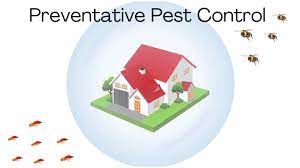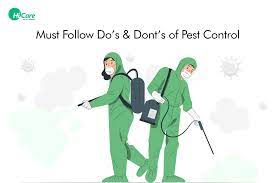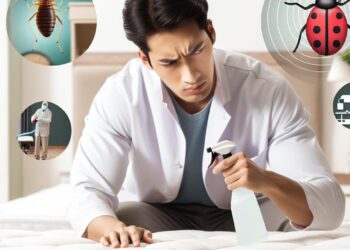Preventive pest control is the process of implementing measures to prevent pests from infiltrating and infesting a property before they become a problem. It is a proactive approach to pest management that can have numerous long-term benefits. In this article, we will explore some of the advantages of preventive pest control and why it is important to invest in this practice.
Preventing Infestations
One of the most obvious benefits of preventive pest control is that it can prevent infestations from occurring. By taking measures to keep pests out, property owners can avoid the headache and expense of dealing with a full-blown infestation. Infestations can be difficult and expensive to eradicate, especially if they have gone undetected for a long time. By implementing preventive measures, property owners can avoid the need for costly and time-consuming pest control treatments.

Protecting Property
Pests can cause significant damage to property. For example, rodents can chew through electrical wires, causing electrical fires, and termites can cause extensive damage to wooden structures. By preventing pests from entering a property, property owners can avoid the damage that they can cause. This can save property owners a significant amount of money in repair costs and prevent them from having to make costly insurance claims.
Improving Health and Safety
Pests can also pose a health and safety risk to occupants of a property. For example, rodents can carry diseases, and cockroaches can trigger asthma and allergy symptoms. By preventing pests from entering a property, property owners can protect the health and safety of their occupants. This can help to prevent illnesses and injuries and reduce the risk of liability claims.
Reducing the Need for Chemical Treatments
Preventive pest control can also reduce the need for chemical treatments. Chemical treatments can be effective in eradicating pests, but they can also be harmful to humans and pets. By preventing pests from entering a property, property owners can avoid the need for chemical treatments and reduce the risk of exposure to harmful chemicals. Saving Time and Money
Preventive pest control can also save property owners time and money in the long run. By preventing infestations and avoiding the need for costly repairs and treatments, property owners can save a significant amount of money. Additionally, preventive measures are often quick and easy to implement, which can save property owners time and minimize disruption to their daily lives.
Maintaining a Pest-Free Environment
Preventive pest control can help to maintain a pest-free environment. By implementing measures to prevent pests from entering a property, property owners can maintain a clean and hygienic environment that is free from pests. This can improve the overall quality of life for occupants of the property and make it a more pleasant place to live or work.
Protecting Reputation
For businesses, preventive pest control can also protect their reputation. A pest infestation can have a negative impact on a business’s reputation, especially if it is a public-facing business such as a restaurant or hotel. By implementing preventive measures, businesses can ensure that they are providing a clean and hygienic environment for their customers and protecting their reputation.
Long-Term Sustainability
Preventive pest control can also contribute to long-term sustainability. By preventing pests from entering a property, property owners can reduce the need for chemical treatments and minimize the impact on the environment. Additionally, preventive measures can help to maintain a healthy and sustainable ecosystem by preventing the introduction of invasive species.

Implementing Preventive Pest Control
Implementing preventive pest control involves taking a proactive approach to pest management. This includes identifying potential entry points for pests and taking measures to seal them off, such as installing screens on windows and doors and sealing cracks and gaps in walls and foundations. Property owners should also ensure that their property is clean and free from food and water sources that can attract pests.
In addition to these measures, property owners should also consider working with a professional pest control company. Pest control professionals have the knowledge and expertise to identify potential pest problems before they become a major issues. They can also provide guidance on the best preventive measures for specific types of pests and implement effective treatments if an infestation does occur.
When choosing a pest control company, it is important to select one that has a good reputation and uses environmentally friendly methods. Property owners should also ensure that the company is licensed and insured and has experience working with their specific type of property.
Preventive pest control is a proactive approach to pest management that can have numerous long-term benefits. By preventing infestations, protecting property, improving health and safety, reducing the need for chemical treatments, saving time and money, maintaining a pest-free environment, protecting reputation, and contributing to long-term sustainability, property owners can improve the overall quality of life for occupants of their property and minimize their impact on the environment.
Implementing preventive pest control involves identifying potential entry points for pests, taking measures to seal them off, and working with a professional pest control company to ensure that the property is protected from potential pest problems. By investing in preventive pest control, property owners can save themselves time and money in the long run and maintain a healthy and sustainable environment for themselves and their occupants.
Overall, preventive pest control is a crucial aspect of property management that should not be overlooked. It is an investment that can save property owners significant amounts of money and prevent them from having to deal with the stress and inconvenience of a pest infestation. Additionally, it can protect the health and safety of occupants, maintain a clean and hygienic environment, and contribute to long-term sustainability.
In today’s world, where there are increasing concerns about the impact of chemicals on the environment and human health, preventive pest control is becoming more important than ever. By implementing environmentally friendly methods and minimizing the need for chemical treatments, property owners can do their part to protect the environment and promote sustainability.
Conclusion
property owners should consider investing in preventive pest control as a long-term strategy for maintaining a healthy and sustainable environment. By taking a proactive approach to pest management and working with a professional pest control company, property owners can enjoy the many benefits that come with a pest-free property, including improved health and safety, reduced costs, and a positive reputation.















